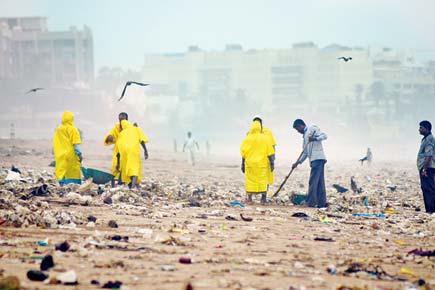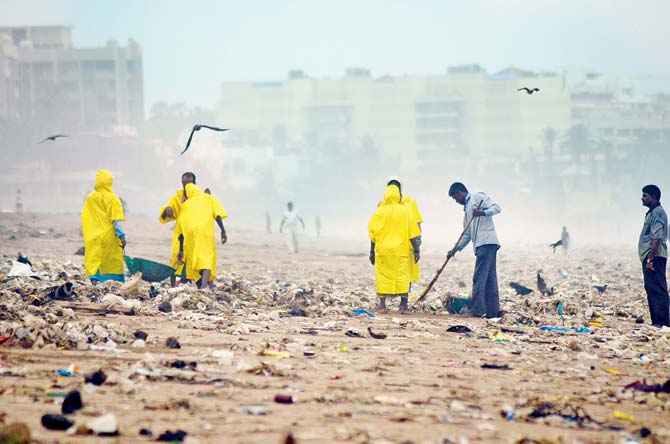As Indians, we are supposedly obsessed with keeping our homes clean. What happens the minute every one of us steps outside?


Clean-up crew at Versova beach covered in waste near Andheri West. Pic/Kaushik Thanekar
 The Railways intend to deploy CCTV cameras for a rather unusual reason this month. According to reports, they want to crack down on people spitting or littering. Think about this for a second. Can you think of any place on earth where a great deal of taxpayers' money must be spent on monitoring people not for their safety or to prevent crime, but on account of their poor civic sense? Is there any place where so much time, energy and money must be spent, year after year, simply because we have a problem keeping our surroundings clean?
The Railways intend to deploy CCTV cameras for a rather unusual reason this month. According to reports, they want to crack down on people spitting or littering. Think about this for a second. Can you think of any place on earth where a great deal of taxpayers' money must be spent on monitoring people not for their safety or to prevent crime, but on account of their poor civic sense? Is there any place where so much time, energy and money must be spent, year after year, simply because we have a problem keeping our surroundings clean?
ADVERTISEMENT
Apparently, the Railway Board in Delhi issued a circular stating that close and effective monitoring of cleanliness needed to be done using live feeds from CCTVs, because the millions of commuters using railway property daily simply weren't doing enough on their own. To be fair to the Railways, they have been trying to get us to change for years. Every train journey in Bombay, for instance, begins not just with an announcement of where the train is headed and how we must take care of senior citizens or switch off fans that aren't in use, but how we really must try and keep the stations clean because, as the announcer appeals to us, they are 'our property.' Naturally, no one listens to the announcer, because we don't like anyone telling us where we can and can't spit. And so, the Railway Police Force has supposedly been asked to share CCTV data with ticket collectors or station masters, so that offenders can be caught and fined between Rs 200 and Rs 500.
This apathy doesn't restrict itself to the railways alone. It shows up the minute we step outside, from the paan-stained walls of most buildings to the corners of every street where debris magically accumulates for years, with no one ever taking the time to sweep them even cursorily.
It shows up in buses, where fellow commuters choose to spit at traffic signals, joining others who feel the need to spit from rickshaws and cabs, for reasons known only to them.
There are two large garbage bins in the locality I live in, both of which are emptied regularly. And yet, the spot designated for them has been converted into a makeshift shelter, which means they both stand awkwardly in the middle of the street, compelling traffic to negotiate a way around them daily, despite them being patiently placed aside every other day. A significant amount of garbage also finds itself outside the bins, simply because the effort of carefully emptying bags into them is too tiresome for some people.
Why do we have this massive disconnect between how we treat our private and public spaces? How many times have we found ourselves next to fellow commuters who are busy trying to shove empty plastic bottles outside the windows of a moving train, biscuit wrappers on the floor, or garbage brought from home into a passing water body? Why do we condone this? How do we allow our children to observe these acts of desecration - which they are, because to litter is, in effect, to deface property in some manner - without worrying about the impact this have on their sense of civic duty? Most importantly, how do we leave these obnoxious habits behind the minute we set foot in a country that is not our own?
The consequences of our perennial apathy are many, from streets that flood on account of choked gutters to the rise in infectious diseases, although none of these things seem to bother us as much as they ought to. It's also why an official of the Mira-Bhayander Municipal Corporation recently pegged the cost of cleaning even a small pond at approximately Rs 2 crore.
It's interesting how our peculiar notion of cleanliness is always restricted only to a tiny space outside our tiny apartments. It rarely extends beyond the boundary of our building lobbies either, and prevents us from castigating people who litter our shared surroundings with impunity. We tend to let these things go because we believe nothing can change, which is why one of my new heroes is a 36-year-old lawyer named Afroz Shah, who single-handedly convinced the residents of Versova that their beach could be saved. Everything he has done, with the help of volunteers, may disappear in weeks, but the fact that he still pulled it off, if even for one brief shining moment, ought to give us all hope.
When he isn't ranting about all things Mumbai, Lindsay Pereira can be almost sweet. He tweets @lindsaypereira. Send your feedback to mailbag@mid-day.com
 Subscribe today by clicking the link and stay updated with the latest news!" Click here!
Subscribe today by clicking the link and stay updated with the latest news!" Click here!







